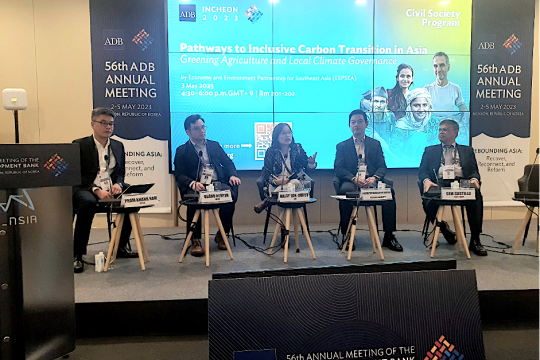Four researchers from Southeast Asia, including two from EfD Vietnam, participated in a special session on "Pathways to inclusive carbon transition in Asia: Greening Agriculture and Local Climate Governance" at the 56th Annual Meeting of the Board of Governors of the Asian Development Bank. The session was hosted by the Economy and Environment Partnership for Southeast Asia (EEPSEA) and aimed to foster dialogue and knowledge-sharing among researchers, policymakers, and practitioners.
It was opened by Pham Khanh Nam, Director of EfD Vietnam, who emphasized that an inclusive carbon transition is a key challenge for Asia, as the region faces the dual goals of reducing greenhouse gas emissions and ensuring social welfare.
Different strategies were presented
The session featured three presentations that covered different aspects of an inclusive carbon transition in Asia. Nguyen Quang, EfD Vietnam, presented a policy review of developing countries in Asia and discussed various strategies, such as carbon pricing, renewable energy, and sustainable agriculture, that could help achieve low-carbon development.
Phumsith Mahasuweerachai, Khon Kaen University, analyzed the greenhouse gas emissions and livelihood impacts of different rice practices in Thailand and suggested ways to make the benefits of greener agriculture more visible.
Gem Castillo of the Economy and Environment Group Philippines shared his experience of co-creating a climate governance model with local stakeholders in Iriga City and highlighted the challenges and opportunities for strengthening community resilience.
Fostered dialogue and knowledge-sharing
After the presentations, a panel discussion was coordinated by Pham Khanh Nam. Haidy Ear-Dupuy, the head of the ADB's Civil Society Unit, gave the ADB’s reflections and perspectives on the presentations. She spoke highly of the quality of the session and the compelling evidence presented in the talks.
Overall, the session was successful in fostering dialogue and knowledge-sharing among participants. It provided a foundation for further discussion, network-building, and collaborations to advance research and policy agendas.
"The session highlighted the importance of considering the social and economic impacts of carbon transition policies on vulnerable communities and engaging with local communities in designing and implementing climate policies," said Haidy Ear-Dupuy.
By: Nguyen Quang
